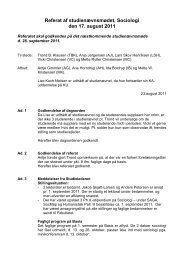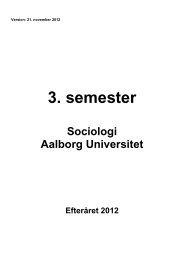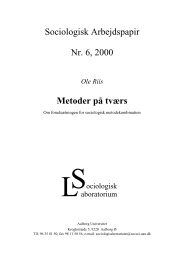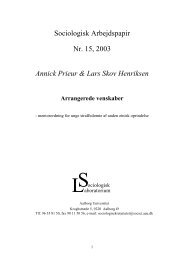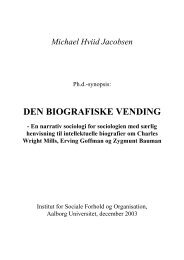Utopianism in the Work of Zygmunt Bauman - Sociologi - Aalborg ...
Utopianism in the Work of Zygmunt Bauman - Sociologi - Aalborg ...
Utopianism in the Work of Zygmunt Bauman - Sociologi - Aalborg ...
Create successful ePaper yourself
Turn your PDF publications into a flip-book with our unique Google optimized e-Paper software.
<strong>of</strong> modernity and postmodernity have been attacked for <strong>the</strong>ir focus on coercion,<br />
heteronomy and conformity as opposed to freedom, autonomy and ambiva-<br />
lence. He is concerned with show<strong>in</strong>g, <strong>in</strong>stead, that noth<strong>in</strong>g <strong>in</strong> <strong>the</strong> social and cul-<br />
tural realm, despite be<strong>in</strong>g presented as such, is natural, <strong>in</strong>evitable or subjected<br />
to a logic <strong>of</strong> necessity (Tester 2002b). As Keith Tester, one <strong>of</strong> <strong>the</strong> f<strong>in</strong>est <strong>in</strong>ter-<br />
preters <strong>of</strong> <strong>the</strong> work <strong>of</strong> <strong>Bauman</strong> suggested: “With<strong>in</strong> his sociology, <strong>Bauman</strong> tries<br />
to show that <strong>the</strong> world does not have to be <strong>the</strong> way it is and that <strong>the</strong>re is an al-<br />
ternative to what presently seems to be so natural, so obvious, so <strong>in</strong>evitable”<br />
(Tester <strong>in</strong> <strong>Bauman</strong> & Tester 2001:9). That is <strong>the</strong> mark <strong>of</strong> dist<strong>in</strong>ction <strong>of</strong><br />
<strong>Bauman</strong>’s sociology whe<strong>the</strong>r concerned with scientific dogmas from realism<br />
constra<strong>in</strong><strong>in</strong>g humanity <strong>in</strong> envisag<strong>in</strong>g alternative modes <strong>of</strong> action (cf. <strong>Bauman</strong><br />
1976b) or <strong>in</strong> deal<strong>in</strong>g with social arrangements obstruct<strong>in</strong>g <strong>the</strong> realisation or ac-<br />
tualisation <strong>of</strong> such modes. Whe<strong>the</strong>r one wishes to term this ‘utopianism’ or not<br />
is naturally a matter <strong>of</strong> choice <strong>of</strong> vocabulary but <strong>in</strong> my m<strong>in</strong>d <strong>the</strong>re is no doubt<br />
that his ideas constitute a v<strong>in</strong>tage example <strong>of</strong> utopianism when applied to social<br />
thought. 1<br />
Be<strong>in</strong>g utopian or espous<strong>in</strong>g utopian ideas does not necessarily mean that<br />
one is world-weary or lives <strong>in</strong> an illusion although this has <strong>of</strong>ten been <strong>the</strong> accu-<br />
sation raised aga<strong>in</strong>st those scholars or academics attempt<strong>in</strong>g to present alterna-<br />
tive visions <strong>of</strong> <strong>the</strong> social or moral order. Thus, almost half a century ago, <strong>the</strong><br />
American political scientist and economist, Andrew Hacker, noted on <strong>the</strong> repu-<br />
tation <strong>of</strong> utopians with<strong>in</strong> social <strong>the</strong>ory:<br />
It is no secret that <strong>the</strong> Utopian is not a respectable member <strong>of</strong> <strong>the</strong> company <strong>of</strong> po-<br />
litical and social <strong>the</strong>orists. Of course, it must be acknowledged that his breed<br />
never was numerous […] There have, <strong>of</strong> course, been Utopian murmur<strong>in</strong>gs <strong>in</strong> a<br />
variety <strong>of</strong> writ<strong>in</strong>gs rang<strong>in</strong>g from Marxists to current-day followers <strong>of</strong> Adam Smith<br />
[…] But all have been roundly attacked: attacked on <strong>the</strong> seem<strong>in</strong>gly self-sufficient<br />
7



